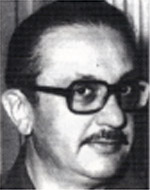Son of Sheindel and Dov Rosenboim was born in Leipzig, Germany, on October 15, 1988. His parents, who were born in Poland, emigrated to Germany and made a living from commerce, and in 1942 he was forced to stop high school when he was exiled with Benny His family and his three brothers were killed in the Holocaust, and as a boy, he managed to survive after being saved several times from death, and as a Holocaust survivor left Germany, he moved to Italy and in January 1946 he arrived in Israel as an internee on the ship “Enzo Sereni.” In 1947 he married Chaya Lev Levit, who had two sons, Dov and Natan He was drafted into the IDF in July 1948 and at the beginning of his career was marked as a person “with an organized mind, deep and creative, easy to learn, with written, verbal, thorough, diligent, reliable …” , Who began a third position in a second-rank infantry battalion. For several years he held many positions as a three-officer officer and as a staff officer, including: Assistant officer of the brigade platoon: as a staff officer in the IAF / Organization and a deputy in the Southern Command. Graduated from the IDF’s Interdisciplinary College of Command and Staff in 1961. He was appointed officer of the Training Command in December 1961. During those years he organized the IDF’s large marches, in which tens of thousands of soldiers and civilians marched, and managed the soccer team of the Training Command, In those years. As head of an organizational branch in the training department, he was appointed in 1965 and promoted to lieutenant colonel. During the Six-Day War he served on the southern front as an officer in a divisional entity. At the end of the war he was assigned to concentrate the lessons of the Personnel Branch in the field of adjutant and the results of his research he published in a book on the doctrine of adjutant in war. He was responsible for the reinforcement of the army’s manpower units (regular and reserve duty), and during the Yom Kippur War he took part in the mobilization of forces and during the war he worked extensively to reinforce manpower and enable the establishment of new units and the completion of manpower gaps in the units that were damaged. Reserve duty, as head of the recruitment center at the General Staff Was appointed to the rank of colonel at the end of 1973. He headed a large-scale operation to establish a national recruiting office through which thousands of dismissed security service employees were relieved and relieved of the burden of post-Yom Kippur war. Enlisting and setting up a new recruitment policy, which dealt extensively with the development of youth prior to enlistment in military boarding schools and other frameworks, and established the first military framework for the treatment of marginalized youth, training them in work groups, He served in the United States and Canada in March 1978. In this role, he contacted Israeli citizens living abroad and established a system to maintain contact with reserve soldiers, and worked closely to strengthen ties with the Jewish community and its institutions. “A-Prat was appointed in October 1980. In this role, he was responsible for the welfare and service conditions of the IDF soldiers in compulsory, permanent and reserve service, and deepened the treatment of the new immigrants’ service conditions and the treatment of the discharged soldier. Housing, and improved conditions in the areas of wages and pensions, loans, and consumerism Lom Hagalil, took care of the individual services of the fighters,In Lebanon. He served in the army for 36 years, during which he saw his mission as a soldier. He devoted most of his life, almost for a generation, to diverse work in the various fields of the manpower division. His commanders and friends say that over the years he has shown exceptional organizational ability, was a professional and experienced officer, stuck to the principles. He always saw the soldier as a man. Despite his great contribution, his virtues and singularity that he had done for nothing had always acted modestly and modestly. On 21 June 1984, he died of a Lev attack shortly after he was widowed by his wife, Chaya z “l, who was buried at the cemetery in Petach Tikvah. , Major General Amos Yaron, that Yitzhak was “commander, soldier and man”
